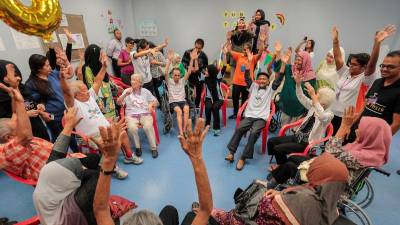AT my grandfather’s care home in Penang, the staff work tirelessly to care for dozens of elderly residents.
Yet, one incident remains etched in my memory: an elderly woman, frail but full of life, collapsed alone in her room. No one noticed for hours. When help arrived, it was too late.
Stories like these are not uncommon in Malaysia’s ageing care homes, where small warning signs often go undetected until they escalate into emergencies.
This is not just a personal tragedy; it is a national challenge. Malaysia is rapidly ageing. By 2044, 14% of our population will be over 65, classifying us as an “aged nation”.
The implications of this demographic shift are profound: increasing demand for healthcare services, shortages of caregivers and a rise in chronic illnesses among the elderly.
Unless we address these issues proactively, we risk a healthcare crisis of unprecedented scale. The question is: how can we ensure that the elderly
in Malaysia live not just longer but better lives?
Predictive health monitoring
One potential answer lies in predictive health monitoring – a solution at the intersection of engineering and caregiving.
By using sensor-based technologies, we can monitor vital signs, detect falls and even predict medical emergencies before they occur. These tools act as silent guardians, alerting caregivers and doctors to subtle health changes that may otherwise go unnoticed.
For instance, wearable sensors can track heart rates and blood oxygen levels, identifying early signs of cardiovascular distress. Motion sensors in rooms can detect immobility, a key indicator of falls. Bed sensors can monitor sleep patterns and respiratory irregularities.
Combined with real-time alerts sent to caregivers’ smartphones or computers, these technologies can significantly reduce response times and improve outcomes.
In Malaysia, integrating these systems into care homes can transform eldercare. Predictive monitoring will not only save lives but also alleviate the burden on overworked caregivers and healthcare facilities. It is a win-win solution, one that biomedical engineers like me are excited to explore and implement.
Making a difference
As a biomedical engineering student, my journey has been shaped by a deep sense of responsibility to design solutions that make a tangible difference.
My recent project-based learning initiative focused on sensor-based systems for elderly care. While working on prototypes, I realised that engineering is not just about machines or circuits; it is about understanding human needs and solving problems that matter.
I often reflect on the ethical implications of our work. How do we ensure these technologies are affordable for underfunded care homes in rural areas? How do we design systems that are user-friendly for elderly residents and caregivers with limited tech literacy?
And most importantly, how do we maintain the dignity and privacy of the individuals these devices monitor? This is the challenge and privilege of being
a biomedical engineer in an ageing society: we don’t just build devices; we build lifelines.
Challenges and opportunities
Despite its promise, implementing predictive health monitoring in Malaysia is not without hurdles. Cost is a significant barrier, especially for smaller care homes that struggle to afford even basic equipment.
Additionally, digital literacy among caregivers and the elderly is a challenge that cannot be ignored. However, these obstacles are not insurmountable.
Public-private partnerships, government grants and academic collaborations can help make these technologies accessible. For instance, Malaysia’s Health Ministry can establish pilot programmes in public eldercare facilities to test and refine these systems.
Universities can work closely with hospitals and tech companies to develop cost-effective solutions tailored to our local needs.
As biomedical engineers, we must also prioritise human-centred designs. It is not enough for our devices to work; they must seamlessly integrate into daily life without overwhelming users. This requires empathy, innovation and a commitment to inclusivity.
Ageing is inevitable but suffering from its challenges doesn’t have to be. With the right investments and collaborations, Malaysia can set a global example in eldercare innovation.
Predictive health monitoring is not a silver bullet but it is a critical step towards ensuring that our ageing population lives with dignity, independence and security.
To my fellow engineers: this is our moment to make a difference. Let’s design solutions that don’t just push the boundaries of technology but also uplift the lives of those who need them most.
To policymakers and healthcare providers: invest in the future of eldercare. Support research, fund pilot programmes and ensure that these technologies reach the communities that need them.
And to everyone else: let’s remember that how we care for our elders today is a reflection of the society we will inherit tomorrow. One sensor, one alert, one life saved. And these are the building blocks of a better Malaysia.
Turukesh Vellasamy is a final year biomedical engineering student at the Department of Biomedical Engineering, Faculty of Engineering, Universiti Malaya.
Comments: letters@thesundaily.com
